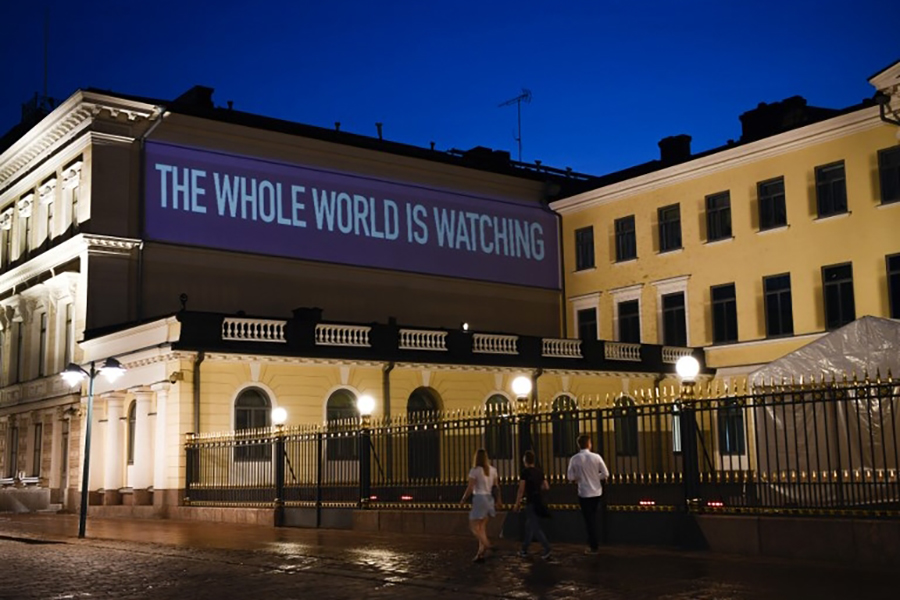
By Nicholas Wheeler, Professor of International Relations
Department of Political Science and International Studies, University of Birmingham
Professor Marcus Holmes, The College of William and Mary
If Helsinki achieves this, or at least paves the way to an eventual agreement, then Trump will have some claim that he has forged a personal bond with Putin that eluded his predecessors.
President Donald Trump has said that past US leaders lacked the “chemistry” to achieve a breakthrough with Russian leaders. But one of the fascinating questions that will be answered when Trump meets Russian President Vladimir Putin today in Helsinki is whether they will ‘hit it off’.
In recent years, the West’s relations with Russia have worsened, escalating in tension over the Russian annexation of the Crimea in 2014, Russian military intervention in Syria in 2015, and allegations that Russia hacked into the computers of the Democratic Party, influencing the 2016 US presidential election. As a result, the need for the two most powerful nuclear states to build trust in their relationship is an urgent one. The question is, will Trump and Putin be able, in their first bilateral summit meeting (having met bilaterally twice before at the G20 and Asia-Pacific Economic Cooperation summits), to develop the kind of trust that might reverse the spiral of escalating competition?
When President George W. Bush first met Putin at the Slovenia Summit in 2001, he famously said, “I looked the man in the eye. I found him to be very straightforward and trustworthy”. The deterioration in US-Russian relations that subsequently ensued showed that either Bush was wrong in his assessment of Putin’s trustworthiness and Putin exploited his trust, or that whatever personal trust existed between the two leaders could not bridge the widening ideological gulf that was opening up as Russia became an increasingly autocratic state under Putin’s leadership.
Close to two decades later, President Trump claimed that he and Kim had developed “a special bond” and that, “I think he trusts me, and I trust him”. Trump’s claim at the Singapore summit is open to the response that even if he genuinely believes he and Kim bonded at their meeting, the North Korean leader was faking his admiration and the sense of personal chemistry, lulling Trump into believing that he is sincerely committed to ending North Korea’s nuclear programme, despite the absence of concrete and verifiable assurances, in the belief this will lead Trump to make concessions.
Many are worried that a similar dynamic could occur in Helsinki. Trump may come away from the summit believing that he and the Russian president have developed a bond, and that as a result, Trump will give away key concessions to the Russian leader at a time when many are highly distrustful of Russian intentions. The fact that Trump is insisting that his meeting with Putin be just the two of them and two translators creates alarm that the US president might acquiesce to Putin’s annexation of the Crimea, not press him on Russia’s meddling in the 2016 Presidential Election or actions in Syria, and perhaps even cancel NATO exercises in the Baltics.
Domestically, it is likely that Trump also feels he is being pulled in two directions: on the one hand, there is a need to delegitimise the Mueller inquiry by demonstrating resolve in front of Putin, and a desire to ‘reset’ a relationship that soured under his predecessor on the other. This potentially leaves the US president exposed to a Russian leader who senses that he can secure concessions from Trump that were denied him by Obama.
Trust proved elusive between Obama and Putin because neither leader was able to reassure the other that they were committed to mutual security rather than pursuing unilateral gains at each other’s expense. To form a genuine bond with trust, a starting point would be for Trump and Putin to agree to extend the 2010 New START agreement on nuclear arms, which expires in 2021. Extension would ensure that there was some degree of regulation of each side’s future arsenals. As such, it would be a tangible signal from both sides of their commitment to nuclear risk reduction at a time when both leaders are planning further modernisations of their nuclear forces.
If Helsinki achieves this, or at least paves the way to an eventual agreement, then Trump will have some claim that he has forged a personal bond with Putin that eluded his predecessors. But the price that this comes at, in terms of concessions conceded to the Russian leader, remains to be seen.

2 thoughts on “Fake bonding? Will Trump and Putin’s Helsinki meeting replay Singapore?”